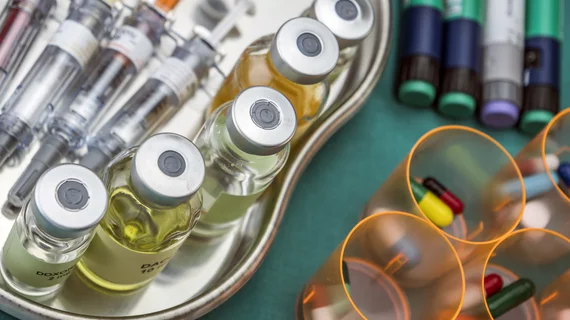Civica Rx partners with Hikma Pharma to launch 14 injectables
Civica Rx, the not-for-profit drug company startup created by hospital and healthcare organizations to reduce the impact of rising drug costs and shortages, has found another pharmaceutical partner to manufacture and supply 14 essential sterile injectable medications.
The drugs are used commonly by hospitals in emergency care, pain management and to treat hypertension, and they are frequently in short supply, according to the announcement. A list of the drugs will be published “in the near future,” with shipments expected before the end of the year.
Hikma Pharmaceuticals, a global drugmaker based in London, will produce the injectable medications for Civica as a private label distributor under a five-year agreement. Hikma is also the third largest U.S. supplier of generic injectable medicines with more than 100 products. The manufacturer will use Hikma’s Abbreviated New Drug Applications (ANDAs) and labeling by Civica and National Drug Code.
This agreement recognizes both our ability to deliver a large and consistent supply of quality medicines, and the significant investments we have made to expand our injectable manufacturing capacity and capabilities,” Daniel Motto, Hikma's EVP of Commercial & Business Development, U.S. Injectables, said in a statement.
The partnership comes on the heels of other deals inked by Civica to provide medications to its network of hospital and health system partners. In May, Civica––which was founded with more than $100 million in backing from industry players such as Mayo Clinic, Intermountain Healthcare and Trinity Health––penned a deal to distribute antibiotics with Xellia Pharmaceuticals. Just last month, the not-for-profit drug startup teamed up with Vizient, an analytics and advisory company, to address drug shortages.
Civica Rx boasts more than 30 health systems as members, representing more than 900 U.S. hospitals and roughly 30% of all licensed U.S. hospital beds. One in every six generic injectable medicines in U.S. hospitals is a Hikma product, according to a press release. Hikma has launched more than 20 medications into U.S. drug shortage situations and received a Drug Shortage Assistance Award from the U.S. FDA in 2016.
"We applaud Hikma's clear commitment to reducing drug shortages," Martin VanTrieste, President and CEO of Civica Rx., said in a statement "Our partnership will help us make an impact as quickly as possible. We specifically chose Hikma because of their strong manufacturing capabilities and believe their excellent quality and supply record will be key to our success in ensuring vital medications are consistently available for hospitals and patients who need them."
As far as cost of the product with Hikma, Civica members will see variable prices based on the product.
"It will vary based on product," a Civica Rx spokesperson told HealthExec about potential savings to members. "All members will be offered the same transparent price delivered from Civica directly to the health system or hospital. The pricing approach is unique to each medication and is based largely on the cost to produce, which is dependent on the time and complexity of the manufacturing process. In general, our aim is to set a fair and sustainable price that provides stability to members and protects them from predatory pricing."

